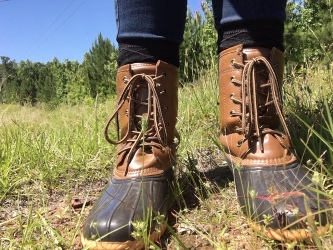

This online news website is owned and operated by Becky Watts. If you enjoy reading Pike County Times, consider buying an advertisement for your business or sending a donation to support the only free online newspaper in Pike County. Donations can be sent to: The Pike County Times, PO Box 843, Zebulon, Georgia 30295. Click here to donate through PayPal. Thanks for supporting Pike County's only free online newspaper!

Photo courtesy of UGA Extension-Pike County
By Brooklyne Wassel, University of Georgia Extension-Pike County, Agriculture and Natural Resources Agent
ZEBULON - By May, Georgia’s most common tick, the lone star tick, has started searching for its first blood meal of the year. During cold periods, ticks remain hidden in shaded, damp areas, like under dead leaves or thick brush. As the temperatures begin to warm up, they crawl up to the top of a tall blade of grass and wait to hitch a ride on unsuspecting hikers, gardeners, pets, and other animals. Ticks then climb their victim until they find a vulnerable, warm spot and dig in. No matter what part of the body becomes the tick’s dining destination, there’s an almost 100 percent chance that the tick started its assault on the victim’s legs. Whenever you walk into grass that touches your legs, you need to take precautions, or you could come home with ticks. You don’t have to be in the woods to pick them up. Long pants, tall socks, and a little common sense will go a long way in helping Georgians avoid ticks this summer.
The best defense against ticks is to stay out of tall grass or brush, when possible. You can reduce access to the skin by wearing long pants that are tucked into boots or socks and tucking in shirts while walking or working in overgrown areas. You may not win any fashion awards, but dressing this way can greatly reduce the number of ticks you contact. Insect repellents with DEET are recommended to provide an extra layer of protection for casual outdoor activities. Those spending a lot of time in brushy areas or in the woods working, hunting, or camping, should invest in a Permethrin treatment, like Permanone. Permethrin based products are only approved for application to clothing and are very effective in repelling all of our most common pests including ticks, chiggers, and mosquitoes. Always follow the instructions found on the product's label to ensure you apply it in the correct amount and in the right places.
Always inspect yourself for ticks after working or playing in a potential tick habitat. If you do need to remove a tick, avoid using essential oils or other tick-irritating substances, burning the tick with a match, or applying rubbing alcohol. These actions may force the tick to move, but usually not before the distressed tick secretes additional saliva, and possibly disease-causing pathogens, into the host’s bloodstream, increasing the chance a of tick-borne disease. The safest way to remove a tick is with fine tweezers or your fingers. Grasp the tick as close to the skin as possible, and carefully pull until the tick is removed. Do not squeeze the large portion of the tick’s body if at all possible, using tweezers will help with this. Remember to wash the bite site and your hands after removing any type of tick.
Ticks carrying Lyme Disease (the black-legged or deer tick in the eastern United States) are in Georgia, but they are not as common as the other species and the adults are most active in the fall. More common are the American dog ticks that can carry the bacteria that causes Rocky Mountain spotted fever. Georgia sees about 75 cases of this illness each year.
In Georgia, the risk of serious illness from a tick bite is low, but there’s no reason to give them a free meal. All tick bites can cause welts and itching that can last up to 10 to 14 days, but you should visit the doctor if you experience fever, extreme headaches, or if a rash develops that’s larger than a dime. Tick-connected headaches or fever tend to arrive five to seven days after tick contact.
We are very fortunate that we don’t have a lot of disease-carrying ticks in Georgia. We just don’t want ticks on us if we can avoid it. One emerging concern surrounding ticks in Georgia is the connection between lone star tick bites and the development of an allergy to mammalian proteins often found in beef and pork. In some instances, the saliva of the lone star tick triggers an immune reaction that leads to an allergy to mammalian meat. It’s not an epidemic, but there is a connection between the state’s most common tick and the allergy. That’s just one more reason to avoid ticks this summer. If you have any questions about protecting yourself or your family from ticks this summer or would like a tick identified, please contact the Pike County Extension office by calling 770.567.2010.